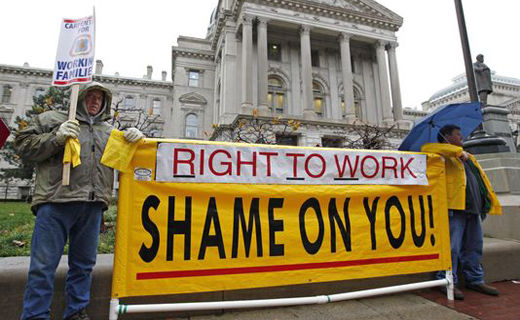
JEFFERSON CITY, Mo. (PAI) – In a pattern sure to be repeated elsewhere, even before Missouri legislators took their seats in early January for the start of the state legislature’s 98th regular session, members of its Republican majority pre-filed 15 bills aimed at attacking workers, weakening unions and lowering wages.
Of the 15 bills, five are right-to-work measures, four from Rep. Bill Lant, R-Pineville.
That’s no surprise, Mike Louis, president of the Missouri AFL-CIO said. It’s also no surprise nationwide: Analysts count similar anti-worker RTW measures pending in eight other GOP-run states, notably including Wisconsin. There, right wing GOP Gov. Scott Walker is nurturing presidential nomination hopes on his record of emasculating unions.
“The people who have insisted on this anti-worker stance and want to lower the wages of all Missourians are still there,” Louis said. “They were re-elected and they haven’t changed their positions.
“The good news is some freshman legislators on both sides of the aisle who were elected have had an open door policy with us in the past, and we are continuing to work with that and, hopefully, will continue to be successful in protecting Missouri’s workers and families.”
It will be an uphill climb, but that’s nothing new.
Incoming House Speaker John Diehl, R-Town and Country, says the legislature will consider making Missouri a right-to-work state in 2015, just as it did last year, and the year before that. The difference, this year, is Republicans have the numbers in both the House and Senate to make it happen, despite the Democratic governor’s veto.
Diehl was a guest last month on St. Louis Public Radio’s Politically Speaking podcast, saying he planned to focus on the state’s economy and what he believes is the best way to improve it. Here’s some of what he had to say:
COMPETE – “The state has some issues in being able to compete in attracting and retaining employers.”
GOVERNMENT ROLE – “I don’t think it’s the role of government to produce economic development….”
FRIENDLY? – “The policies in the states that surround us” – RTW states like Iowa, Nebraska, Kansas, Oklahoma, Arkansas and Tennessee – “are more friendly to business and have an environment that’s more open to starting a business, having a business relocate there and having a culture of entrepreneurialism.”
TAXES – “I believe all things being equal, the lower your taxes are the more competitive you are.” Analysts respond “Tell that to Kansas,” where drastic tax cuts by extreme Right Wing GOP Gov. Sam Brownback have starved public education and other services and led to such an enormous budget deficit that credit rating agencies significantly downgraded Kansas, raising its interest costs.
Diehl hemmed and hawed early in the podcast, but eventually said what he meant when veteran political reporter Jo Mannies asked him directly about RTW.
“We’ll have a very robust discussion on that,” Diehl said. “I think it’s a key thing for a lot of people. I think someday Missouri will be a RTW state. There’s a lot of states around us that are. It’s trending that way. If there’s a Republican Governor, it will be a right-to-work state.”
But “right to work,” which workers call “right to work for less” isn’t the only anti-worker measure pending in the Show Me State’s legislature. Others coming up, versions of which also could arise elsewhere, include:
HOUSE BILLS
HB46 by Rep. Bill Lant, R-Pineville, requires the State Board of Mediation to conduct an election to certify the exclusive bargaining representatives of an appropriate collective bargaining unit for certain public employees every two years. HB127 by Rep. Rick Brattin, R-Harrisonville, is similar, as is SB126 by Sen. Dan Brown, R-Rolla. The bills echo part of Walker’s notorious law against public sector unions, and is modeled on legislation drafted by secretive, pro-corporate Radical Right American Legislative Exchange Council (ALEC).
HB47 by Lant, specifies that all individuals shall be guaranteed the freedom to work without being required to join or pay dues to any labor organization. It’s RTW in disguise.
This bill displays the same audacity as last year’s measure by alleging it provides “freedom to work.” Union leaders are warning Missourians not to be fooled: HB47 is right-to-work and it is anti-freedom. Because right-to-work is about corporate servitude. In other words, wage slavery.
University of California at Berkeley Professor George Lakoff, author of “The Political Mind, Moral Politics” and “Don’t Think of an Elephant,” states these laws are “intended to destroy unions, or at least make them ineffective.”
By stating “simply that workers do not have to pay union dues to take a job – even if they get benefits previously negotiated by a union, most workers who don’t have to pay dues won’t pay, and that will de-fund the unions, killing them and taking away rights unions have fought hard for over generations,” Lakoff explains.
“Without workers negotiating as a unified group,” he continues, “corporations will not have to grant those union-created rights. Corporations will have take-it-or-leave-it power over individual workers. In short, this is corporate servitude: You do what you are told and take what you are offered.”
HB48 by Lant and HB159 by Rep. Holly Rehder, R-Sikeston, prohibit any public employee from being required to pay dues or fees to a labor organization. Again, RTW.
HB69 by Lant, lets public bodies to opt out of prevailing wage laws for public works construction projects that are worth $750,000 or less. That would cut workers’ wages.
HB116 by Rep. Eric Burlison, R-Springfield, prohibits an employer from requiring a person to become a member of a labor organization as a condition or continuation of employment. This is another right-to-work bill. Burlison also filed right-to-work legislation last session. GOP leaders deep-sixed it then.
HJR2 is a constitutional amendment Lant proposes to specify that all individuals shall be guaranteed the freedom to work without being required to join or pay dues to any labor organizations. Lant wants to insert RTW into the state constitution, but voters would have to approve it after the legislature passes it.
HJR3, another proposed constitutional amendment from Lant, bars any public employees from being required to pay dues or other fees to a labor organization.
HB195 by Rep. Warren Love, R-Osceola, changes the laws regarding the prevailing hourly rate of wages in third class counties.
HB286 by Rep. Bill White, R-Joplin, specifies that a person cannot be required to become or refrain from becoming a member of or paying dues to a labor organization as a condition or continuation of employment. This, again, is right-to-work by another name.
SENATE BILLS
SB127 by Sen. Dan Brown, R-Rolla, bars employers from requiring employees to engage in or cease engaging in certain labor practices. Union leaders say his bill is another approach to right-to-work.
SB128 by Brown, modifies prevailing wage laws and provisions relating to project labor agreements – in other words, weakens both wage protections.
SB129 by Brown, is the perennial “paycheck deception” bill to throw workers and unions out of politics. It requires authorization for certain unions to use dues and fees to make political contributions and requires individual worker consent to withhold earnings from paychecks.
“Paycheck deception” legislation, which its right-wing backers disguise as “paycheck protection” is another ALEC/corporate brainstorm, designed to eliminate opposition to the corporate agenda by robbing foes of the right to fund their campaigns.
Tim Rowden is Editor, St. Louis Labor Tribune
Photo: Republicans are expected to introduce right to work (for less) bills in Missouri again this year and in a number of other states with Republican governors. | Darron Cummings/AP











Comments